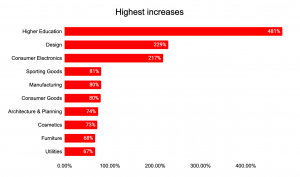It feels good to be in the Ivy League, doesn’t it? And it feels even good to be the top olive in one of them universities, right?
Just as the early bird gets the worm, sites that are up there in the first few ranks, get the customers. The search ranking is a boxing ring. Minute on minute, brands and businesses are training hard to be at the top. What’s fascinating is that the ways they are sweating it out are not only creative, but effective to say the least. Does that mean all search engine optimisation protocols are fool-proof? Not necessarily.
Recently, a report was published on how Google can change the fate of an election. Apparently, candidates who show up in the top ranks have the strong possibility to alter voting preferences of indecisive voters by 20%.
The percentage, as we can understand is not set in stone. In another experiment conducted by American psychologist, Dr Robert Epstein, who was also the ex-Chief Editor of Psychology Today, recruited 2000 undecided voters in India. The task for these subjects was to perform searches on Google of the real candidates who stood for the current election. In the background, as the experimental subjects were looking up the candidates, Epstein was meddling with the search results.
He said, “If you look at the numbers in our study, up to 25 percent of elections around the world would be decided by a computer program. We found that we could push people’s preferences easily by more than 12 percent in the direction of any candidate that we chose.”
According to the National Academy of Sciences, the Search Engine Manipulation Effect (SEME)’s possible effect on the outcome of elections disclosed that about 50% of clicks are on the results that appear on the first two results on the first page of the search. 86% of the voters in the USA get all the meat they want from their contesting candidates online. More than what they could gather in the yesteryear pamphlets. In the 2010 U.S. congressional elections, Facebook’s ‘get out the vote’ message to its users triggered 340,000 people to step out and vote.
An article from Gerry McGowen says that people like to navigate more than they like to search. As in, once they find the search result, they enter the result and navigate from within.
He means to say that the search ranking is not as important as the substance in the result itself. Therefore even if links show up in the first two results, it all depends on how much quality and offering is involved within that website.
Integration is very important under the current SEO umbrella. Along with the intelligent tactics of search engine optimization, other circuits like social media, copywriting, tracking metrics, conversion optimization and content development have to be complete and fulfilled in order for a website to be of value and have the capacity to retain its hold on the search engine podium.
The universe of SEO is constantly changing. A strategy that might have brought in millions of users to click on a link might not be as fit and promising to even accumulate a bare 1000 users tomorrow. The requirements, terms and conditions of SEO are constantly changing.
Most new websites are pulling their hair in frustration, as they are under the impression that if they wrote hundreds of rich keyword-density articles, they are going to dominate the search scene. But as far as reality goes, it is anything but their juvenile expectations.
The search engine’s primary role is to provide relevant information to a search query. And it wants to provide the best possible answer to your search. It cannot do that if it just shows up the links that have been strategically beefed with keywords. Speaking of keywords, plain old phrasing or keywords is not going to cut the cake for a website’s benefit on the search engine.
A website must understand all that it has to about semantic search optimization. Why? Because that’s what the 2013 Hummingbird update demands. Once the Hummingbird stepped in, the world of search optimisation has been categorised into pre-Hummingbird and post-Hummingbird. With the Hummingbird update, every word and every line counts.
What happens with long-tail keywords is that it expands the ambit of a search query. To give an estimate, a search for car dealers in your city will include mechanics and towing agencies. Whereas, the LSI (Latent Semantic Indexing) keywords will help your website rank better on the search results page, simultaneously increasing the fertility of on-page optimisation and increasing the range of off-page link building. Websites are also increasingly taking the LSI suggestions made by Google at the end of a web page.
Though search engine optimization is meant to bring in organic traffic, its horizon has broadened with the increase in the number of channels. With this, the search algorithms are driven by several factors that pay special attention to optimizing engagement on social media.
When a link shared on Twitter and Facebook engages people through discussions and shares, and encourages users to click on the links and stay on the link page for quite sometime, it is nurturing traffic.
Issac Lai, a Digital Marketing Specialist at Sparro, says, “You have to now look at all channels and their impact on your site traffic. Search, social, PR and UX optimization are all becoming intertwined and must be considered in the same strategy.”
What matters is substance. No matter how much you feed Google and manipulate the search engine with state-of-the-art gimmicks, if a business is not providing quality of material on the website, keeping in mind the business goals and audience, all of the SEO circus will sell no tickets for its show.
Websites have to commit the fact to memory that search engines, being a portal to display and execute their business ideas and motto, will take time to find their feet the first few months. Implementing best SEO practices, abiding by Google’s constant updates as it has to assess, manage, and organize millions of bytes of information uploaded to it every day, and optimizing and providing mobile-friendly pages is a steady and patient process.
With diligent research, keenness, and innovation it is possible to work SEO in our favor. So, are you ready?
(145)






